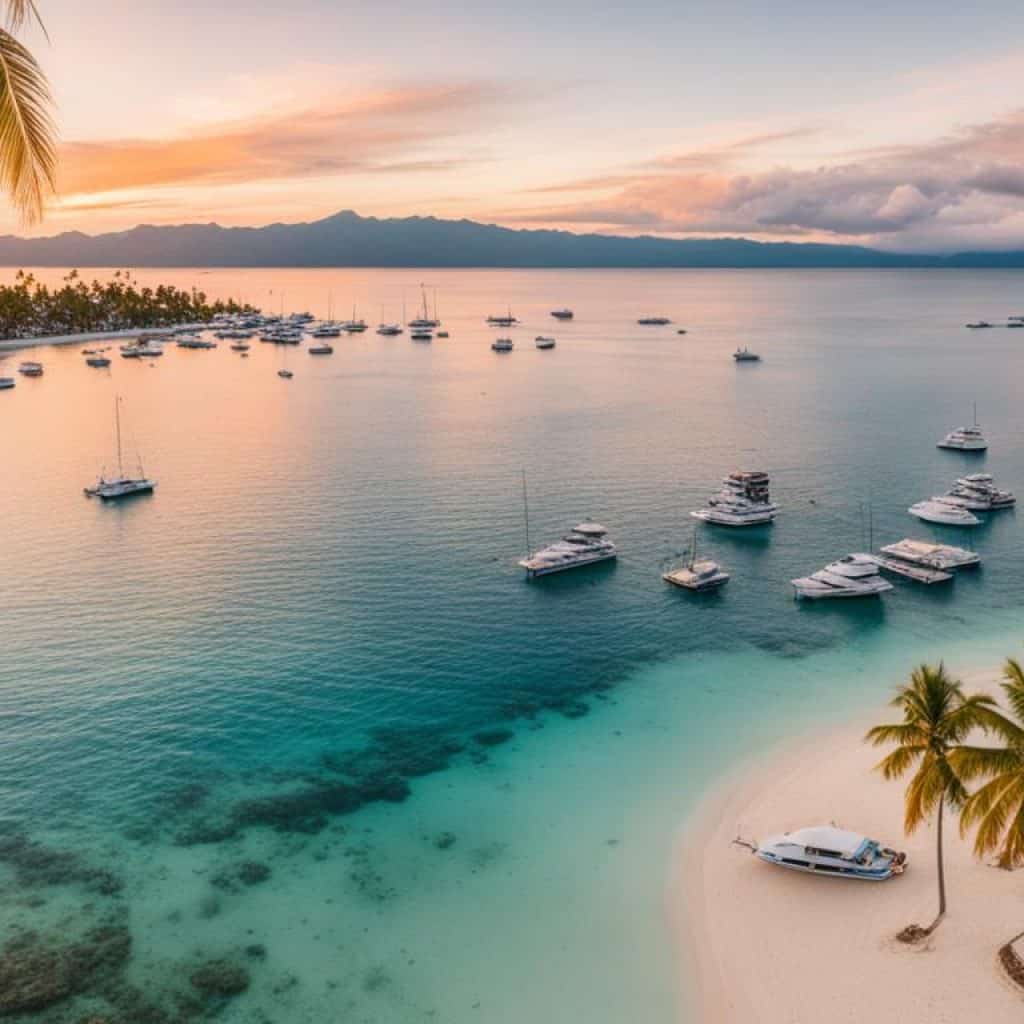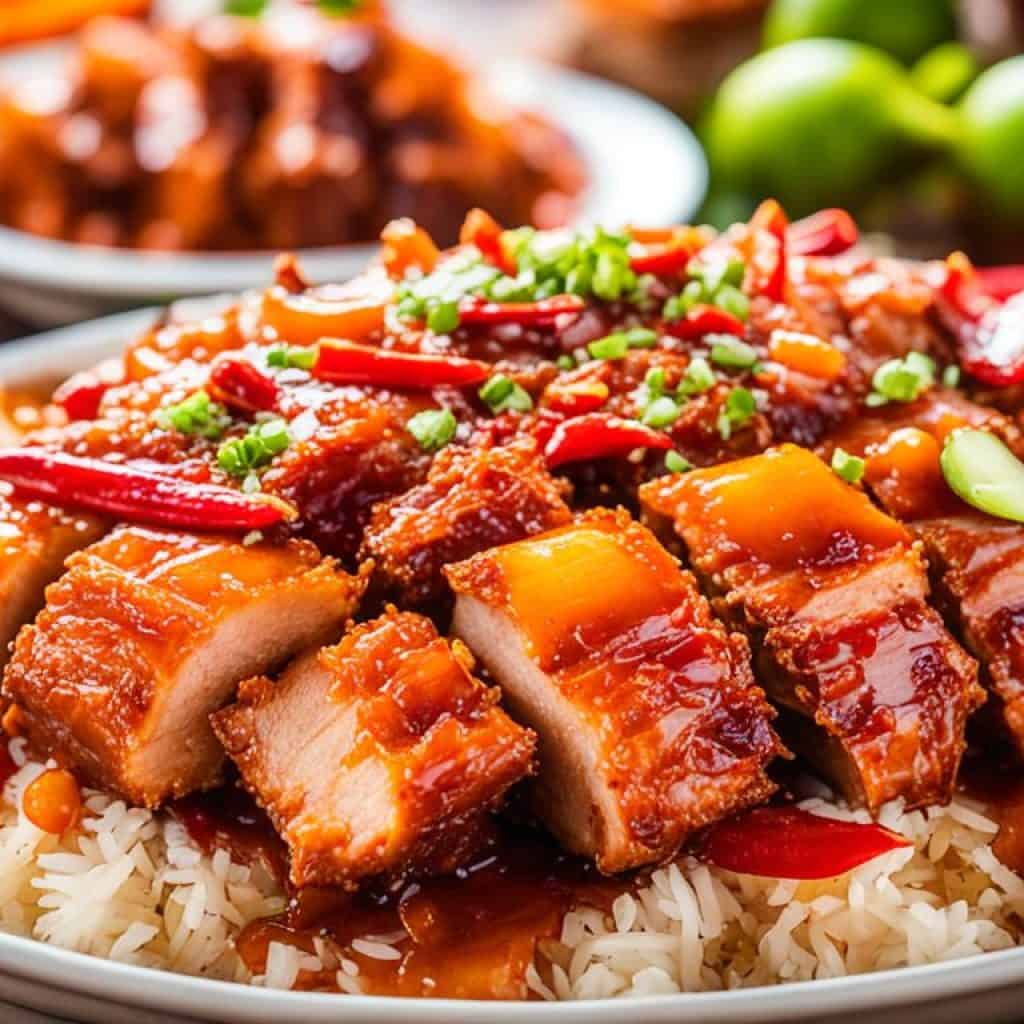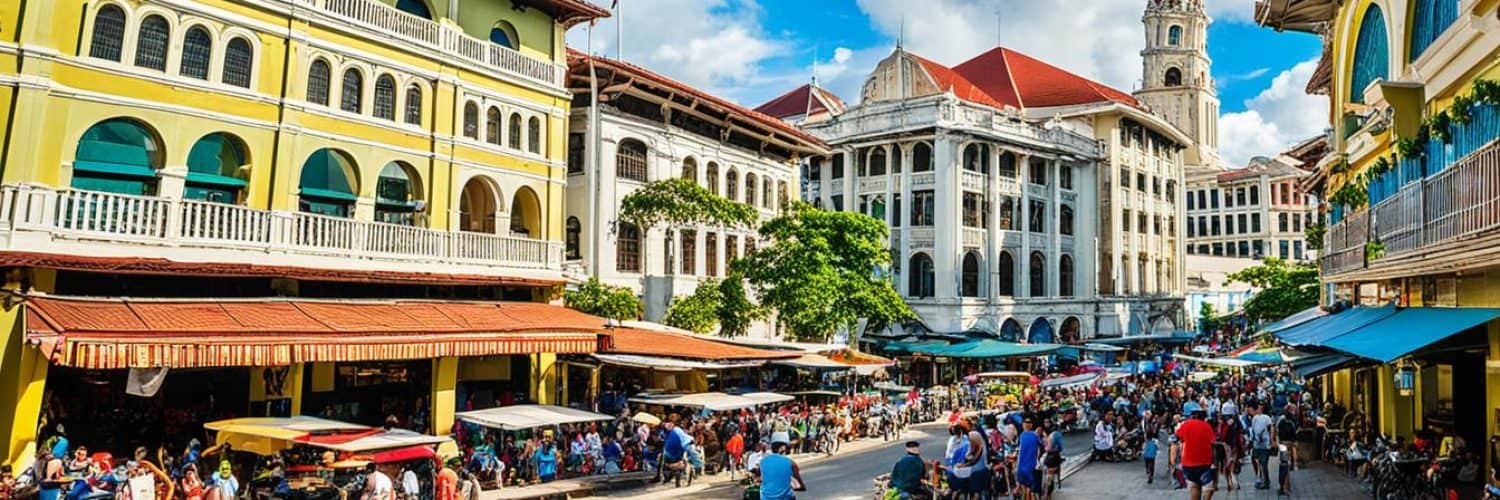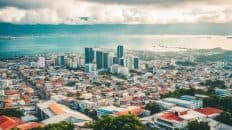Have you ever wondered which city in the Philippines holds the title of being the oldest? Prepare to embark on a journey through time as we delve into the historical significance of Cebu City, the oldest city and the first capital of the Philippines. Discover the secrets of its Spanish colonial past, explore its heritage sites and cultural landmarks, and learn why it has become a top tourist destination in the country. Buckle up, history enthusiasts, and get ready to immerse yourself in the rich tapestry of Cebu City’s captivating story.
Key Takeaways:
- Cebu City is the oldest city and the first capital of the Philippines.
- It boasts a rich historical significance from the Spanish colonial era.
- Home to numerous heritage sites and cultural landmarks, Cebu City is a must-visit location for those interested in history and culture.
- The city’s oldest university, San Carlos University, and the oldest street, Colon Street, bear testimony to its Spanish colonial legacy.
- Cebu City is a top tourist destination in the Philippines, attracting visitors from around the world.
Sister City since 1991
Cebu City and Seattle have shared a special bond as sister cities since 1991, fostering a strong connection between the citizens of these two vibrant places. The Seattle-Cebu Sister City Association plays a crucial role in developing this relationship by facilitating cultural and educational exchanges between the communities.
Through cultural exchanges, residents of both cities can experience and appreciate each other’s unique traditions, art, and music, fostering a deeper understanding and appreciation of different cultures. Students, artists, and performers have the opportunity to showcase their talents and learn from one another, enriching their perspectives and promoting global diversity.
Furthermore, the association focuses on strengthening trade ties and promoting tourism between Seattle and Cebu City. By fostering business relationships and collaborative initiatives, this partnership contributes to economic growth and prosperity for both cities. It opens up avenues for trade and investment opportunities, enabling businesses to explore new markets and expand their horizons.
On the tourism front, the sister city relationship paves the way for travelers to discover the wonders of Seattle and Cebu City. Tourists can explore the breathtaking landscapes, immerse themselves in local traditions, and indulge in the diverse cuisines found in both cities. Whether it’s the picturesque sites of Seattle or the historical landmarks of Cebu City, visitors are spoiled for choice when it comes to unforgettable experiences.
“The sister city relationship between Cebu City and Seattle is a testament to the power of cultural exchange and international collaboration. It serves as a bridge that connects people, fostering mutual understanding and respect.” – Mayor of Cebu City
Seattle-Cebu Sister City Association Initiatives
The Seattle-Cebu Sister City Association has been instrumental in organizing various initiatives that promote cultural exchange, education, trade, and tourism between the two cities. Some of these initiatives include:
- The Cebu-Seattle Student Exchange Program, providing students with the opportunity to study abroad and experience a different educational environment.
- The Seattle-Cebu Art Festival, showcasing the diverse artistic creations of local artists from both cities.
- The Seattle-Cebu Business Forum, bringing together business leaders and entrepreneurs to explore trade opportunities and foster economic ties.
- The Cebu-Seattle Cultural Festival, celebrating the rich cultural heritage of both cities through performances, exhibitions, and culinary showcases.
These initiatives, among others, highlight the ongoing commitment of the Seattle-Cebu Sister City Association to promote cultural understanding, educational growth, and economic cooperation between the citizens of Seattle and Cebu City.
| Benefits of Sister City Relationship | Cebu City | Seattle |
|---|---|---|
| Cultural and Educational Exchanges | Celebrating and preserving cultural heritage Opportunities for students to study abroad Enrichment through diverse perspectives |
Exposure to Cebu City’s unique traditions and art Opportunities for students to explore a different educational environment Promotion of global diversity and understanding |
| Trade and Economic Cooperation | Exploration of new markets Enhanced business partnerships Collaborative initiatives for economic growth |
Opportunities for businesses to enter the Cebu market Increased trade ties and investment prospects Expanded horizons for Seattle-based companies |
| Tourism | Exposure of Cebu City’s attractions to Seattle tourists Exchange of travel experiences and recommendations Boost in tourism and economic growth |
Exploration of Seattle’s landmarks by Cebu City visitors Exchange of travel experiences and recommendations Stimulus for tourism and economic growth |
The sister city relationship between Cebu City and Seattle continues to thrive, fostering cultural connections, educational opportunities, economic growth, and tourism development. This collaboration between two diverse cities is a shining example of the power of global partnerships and the mutual benefits they bring.
Historical Significance
Cebu City holds great historical significance as it was under Spanish rule for three centuries. This period of Spanish colonization has left a lasting imprint on the city, evident through its architectural heritage and cultural traditions.
One notable historical landmark in Cebu City is San Carlos University, the oldest university in the Philippines. Established by Spanish missionaries in 1595, this prestigious institution has been a pillar of education and intellectual growth for centuries.
Another prominent relic of the Spanish era is Colon Street, the oldest street in the country. Constructed by the Spaniards in the 16th century, Colon Street serves as a reminder of Cebu City’s rich history and its role as a strategic center during the colonial period.
The Spanish influence in Cebu City is evident through its historical landmarks.
These historical sites not only showcase the city’s architectural heritage but also demonstrate its cultural importance. They provide a glimpse into the past, allowing visitors to connect with the city’s roots and appreciate its historical significance.
Cultural Landmarks
Cebu City, with its rich colonial past, is home to several remarkable cultural landmarks that showcase its historical significance and cultural heritage.
“Exploring these cultural landmarks provides a deeper understanding of Cebu City’s captivating history and the influence of its colonial roots.”
Fort San Pedro
One of the must-visit cultural landmarks in Cebu City is Fort San Pedro, a Spanish colonial-era fortress. Built in 1738, it served as a defensive structure during the Spanish occupation. Today, visitors can explore the preserved ruins and admire the Spanish architectural features of this historical site.
Basilica del Santo Niño
The Basilica del Santo Niño is another significant cultural landmark in Cebu City. It is home to the celebrated statue of the Santo Niño, a gift from Ferdinand Magellan to Rajah Humabon, the ruler of Cebu, in 1521. The basilica, built in the 16th century, is a popular pilgrimage site and a testament to the city’s deep-rooted devotion to Christianity.
Magellan’s Cross
Magellan’s Cross, located near the Basilica del Santo Niño, is a symbol of Cebu City’s historical significance. Planted by Ferdinand Magellan in 1521, the cross marks the spot where the first Filipinos were baptized as Catholics. Visitors can observe this iconic landmark and reflect upon its cultural and religious significance.
Cebu Metropolitan Cathedral
The Cebu Metropolitan Cathedral, also known as the Cathedral Church of St. Vitales, is a stunning cultural landmark that exemplifies Spanish colonial architecture. Established in 1595, it has undergone several reconstructions over the centuries but remains an important place of worship for the Catholic community in Cebu City.
Exploring these cultural landmarks allows visitors to immerse themselves in Cebu City’s fascinating history and appreciate the architectural marvels that have stood the test of time.
Top Tourist Destination
When it comes to top tourist destinations in the Philippines, Cebu City is a must-visit for travelers seeking a perfect blend of historical charm, natural beauty, and delicious cuisine. With its rich cultural heritage and vibrant atmosphere, Cebu City attracts visitors from around the world.
The City’s Popular Landmarks
Cebu City offers a plethora of popular landmarks that showcase its historical significance and cultural heritage. From the iconic Fort San Pedro, built by the Spaniards in the 16th century, to the magnificent Basilica del Santo Niño, housing the oldest religious relic in the country, travelers can explore and immerse themselves in the city’s rich past.
But it’s not just the historical landmarks that draw in tourists. The city also boasts vibrant modern attractions, such as the Cebu Metropolitan Cathedral, a stunning architectural masterpiece that showcases the blending of old and new.
Beaches and Beyond
No trip to Cebu City is complete without spending time at its beautiful beaches. From the powdery white sands of Mactan Island to the crystal clear waters of Bantayan Island, there are endless opportunities for sunbathing, swimming, and even snorkeling or diving.
For those seeking adventure, Cebu City offers a variety of outdoor activities. Hiking enthusiasts can explore the stunning landscapes of Sirao Peak and Osmena Peak, while adrenaline junkies can try canyoneering in Kawasan Falls or ziplining in the lush hills of Busay.
Cuisine to Delight Your Taste Buds
One cannot visit Cebu City without indulging in its delectable cuisine. The city is known for its mouthwatering specialty, Cebu Lechon – a succulent roasted pig with crispy skin and tender meat. It’s no wonder that Cebu Lechon is considered one of the best dishes in the Philippines.
Aside from Cebu Lechon, the city also offers a wide range of local delicacies that will surely tantalize your taste buds. From fresh seafood dishes to comforting street food like the famous “balut,” Cebu City’s culinary scene is a food lover’s paradise.
So whether you’re a history buff, beach enthusiast, or foodie, Cebu City has something for everyone. Discover the magic of this top tourist destination and create unforgettable memories in the heart of the Philippines.

Must-Visit Locations
If you’re planning a trip to the Philippines, Cebu City should be at the top of your must-visit locations. As the oldest city in the country, it offers a unique glimpse into its historical past and is a treasure trove of cultural landmarks and vibrant experiences.
Explore the historical city and immerse yourself in its rich heritage. Walk the same streets as the Spanish explorers and discover the remnants of their settlement. From the oldest university in the Philippines, San Carlos University, to the iconic Colon Street built by the Spaniards, Cebu City is a living testament to its historical significance.
“Cebu City, with its vibrant culture and friendly locals, offers a truly unforgettable experience for travelers.”
But Cebu City is not just about its historical background. Its vibrant culture is reflected in the warmth of its people, the delicious cuisine, and the diverse range of attractions it has to offer. Whether you’re strolling through the bustling markets, trying out the local delicacies, or exploring the breathtaking natural landscapes, Cebu City has something for everyone.
Explore the Historical Past
Start your journey by visiting the historical landmarks that showcase the city’s rich heritage. Take a step back in time at Fort San Pedro, the oldest triangular fortress in the Philippines. Marvel at the stunning architecture of the Basilica del Santo Niño, which houses the revered Santo Niño de Cebu. And make a stop at Magellan’s Cross, a symbol of the city’s Christianization during the Spanish colonial era.
Immerse Yourself in the Vibrant Culture
Discover the vibrant culture of Cebu City through its festivals, art galleries, and traditional crafts. Experience the grandeur of the Sinulog Festival, one of the biggest and most colorful cultural events in the Philippines. Explore the local art scene at the Museo Sugbo or the Casa Gorordo Museum. And don’t forget to bring home a piece of Cebu’s craftsmanship, whether it’s the famous Cebu guitars or the intricate handmade accessories.
Indulge in Delicious Cuisine
No visit to Cebu City is complete without savoring its mouthwatering delicacies. Dive into the world of flavors with a taste of the iconic Cebu Lechon, a roasted pig that is known for its crispy skin and succulent meat. Or try something more adventurous with Balut, a Filipino delicacy of boiled duck embryo. From street food to fine dining, Cebu City’s culinary scene is sure to satisfy any food lover’s cravings.
| Must-Visit Locations in Cebu City |
|---|
| Fort San Pedro |
| Basilica del Santo Niño |
| Magellan’s Cross |
| Museo Sugbo |
| Casa Gorordo Museum |
Whether you’re a history buff, a culture enthusiast, or a food lover, Cebu City promises an unforgettable experience. Plan your trip to this historical city and immerse yourself in its vibrant culture. Discover the must-visit locations, indulge in delicious cuisine, and create lasting memories in the heart of the Philippines.
Gaming Hubs and World Class Amenities
Cebu City is known for its gaming hubs and world-class amenities. Visitors to the city can experience the thrill of casino gaming while enjoying luxurious accommodations and top-notch facilities.
“Cebu City offers an unparalleled gaming experience with its renowned Waterfront Hotel and Casino. The hotel features elegant suites, impeccable service, and a wide array of entertainment options. From roulette and blackjack to poker and slot machines, the casino offers a variety of games to suit every gambler’s preference. The 19th-century designed interior combined with modern amenities provides a unique and unforgettable gaming atmosphere.”
Whether you’re a seasoned player or new to the world of gambling, the gaming hubs in Cebu City offer something for everyone. With their state-of-the-art facilities and a wide range of exciting games, these gaming hubs create the perfect setting for an unforgettable gaming experience.
The Waterfront Hotel and Casino, in particular, stands out as a popular landmark in the city. Its world-class amenities, including luxurious suites and a wide variety of gaming options, attract visitors from all over the world. The casino’s elegant and sophisticated ambiance, coupled with its modern facilities, guarantees an unforgettable stay for every guest.
Visitors can immerse themselves in the excitement of playing traditional casino games such as poker, roulette, and blackjack. The gaming hub offers a vibrant atmosphere where both seasoned players and novices can try their luck and enjoy an unparalleled gaming experience.
Another remarkable feature of the Waterfront Hotel and Casino is its attention to detail in design. The 19th-century inspired interior creates an atmosphere of elegance and exclusivity, transporting guests back in time while still providing all the modern comforts they expect from a world-class establishment.
For those seeking entertainment beyond the casino, the Waterfront Hotel and Casino also offers a range of amenities such as luxurious suites, fine dining options, and live performances. Guests can indulge in gourmet cuisine, relax in luxurious accommodations, and enjoy live entertainment shows, making their stay at the hotel a truly memorable experience.
Whether you’re a gaming enthusiast or simply looking for a luxurious retreat with world-class amenities, Cebu City’s gaming hubs, particularly the iconic Waterfront Hotel and Casino, have everything you need to make your stay truly unforgettable.
White Sand Beaches
Cebu City, a tropical paradise in the Philippines, is renowned for its breathtaking white sand beaches. One of the most popular beach destinations is Be Resorts in Lapu-Lapu City. With its pristine shorelines and crystal-clear waters, Be Resorts offers an idyllic retreat for beach lovers.
Explore Pristine Waters and Dive into Adventure
Visitors to Cebu City can revel in the beauty of its white sand beaches, where they can soak up the sun, take refreshing dips in the ocean, and indulge in a variety of water sports. Whether you’re a snorkeling enthusiast or an experienced scuba diver, the diving sites in Cebu will leave you in awe of the vibrant marine life and magnificent coral reefs.
Beach Resorts for a Perfect Getaway
Cebu City offers a range of beach resorts, each providing a unique and unforgettable experience. Be Resorts, in particular, stands out for its luxurious amenities, comfortable accommodations, and picturesque beachfront views. Guests can relax in style, surrounded by the serenity of nature, and enjoy world-class facilities.
Be Resorts is a true haven for beach lovers, where you can bask in the beauty of white sand beaches and indulge in the ultimate beach getaway experience.
Beach Resorts in Cebu City
| Beach Resort | Location | Amenities |
|---|---|---|
| Be Resorts | Lapu-Lapu City | Beachfront views, swimming pool, spa, restaurants |
| Shangri-La’s Mactan Resort & Spa | Lapu-Lapu City | Private beach, infinity pools, wellness center, dining options |
| Mövenpick Hotel Mactan Island Cebu | Lapu-Lapu City | Private beach, swimming pools, world-class dining |
Embark on a tropical adventure and experience the charm of Cebu City’s white sand beaches. Whether you’re seeking relaxation, adventure, or a romantic getaway, Cebu’s beach resorts have it all. Immerse yourself in the natural beauty and tranquil ambiance for a memorable vacation in paradise.
Yummy Delicacies
Cebu City is renowned for its delectable delicacies that will delight any food enthusiast. From succulent roasted meats to unique street food experiences, the local cuisine offers a delightful adventure for the taste buds.
The Best-Tasting Roasted Suckling Pig: Cebu Lechon
When it comes to must-try dishes in Cebu City, Cebu Lechon takes the spotlight. This famous roasted suckling pig is known for its crispy skin, tender meat, and flavorful stuffing. Cebu Lechon is often hailed as the best-tasting Lechon in the Philippines, making it a culinary masterpiece that visitors shouldn’t miss.
A Unique Culinary Experience: Balut
For the adventurous foodies, Cebu City offers the opportunity to indulge in Balut, a popular Filipino street food. Balut is a fertilized duck egg that is boiled and enjoyed as a snack. This unique delicacy provides a distinctive texture and flavor that is both intriguing and satisfying.
Exploring the local cuisine in Cebu City goes beyond these two iconic dishes. Visitors can also savor a variety of mouthwatering dishes that celebrate the city’s rich culinary heritage. From fresh seafood and exotic fruits to traditional Filipino favorites, Cebu City offers a diverse range of flavors that cater to every palate.
Must-Try Cebu City Delicacies:
- Sinigang – A comforting sour soup made with tamarind, meat, and vegetables.
- Chicharon – Crispy pork rinds that are perfect for snacking.
- Adobo – A classic Filipino dish made with marinated meat cooked in vinegar, soy sauce, and spices.
- Tuslob Buwa – A unique street food experience where pork liver and innards are simmered in a savory sauce and enjoyed with puso (hanging rice).
Whether dining at one of the city’s upscale restaurants or exploring the vibrant street food scene, visitors can be assured of an exceptional culinary journey in Cebu City.
| Dish | Description |
|---|---|
| Cebu Lechon | A roasted suckling pig with crispy skin, tender meat, and flavorful stuffing. |
| Balut | A fertilized duck egg that is boiled and enjoyed as a snack, providing a unique textural and flavor experience. |
| Sinigang | A comforting sour soup made with tamarind, meat, and vegetables. |
| Chicharon | Crispy pork rinds that are perfect for snacking. |
| Adobo | A classic Filipino dish made with marinated meat cooked in vinegar, soy sauce, and spices. |
| Tuslob Buwa | A unique street food experience where pork liver and innards are simmered in a savory sauce and enjoyed with puso (hanging rice). |
Visiting Cebu City offers not only a feast for the eyes but also a flavorful adventure for the senses.

Historical Background
Cebu City, a historical city in the Philippines, has a rich and captivating past. Its story begins with the arrival of Spanish explorers in 1521, marking the start of a new era in this thriving settlement.
By 1565, Cebu City had transformed into a Spanish settlement and played a crucial role as the first capital of the Philippines. The Spanish influence can still be seen in the city’s architecture, traditions, and cultural heritage.
Throughout history, Cebu City has been a witness to significant events, shaping the course of the country’s development. It played a pivotal role during the Spanish and American occupation, embodying the struggles and triumphs of the Filipino people.
“Cebu City’s historical background showcases the resilience and spirit of its people, as they navigated through different colonial eras and emerged as a vibrant and culturally diverse city.”
Today, Cebu City stands as a testament to its rich history and is a must-visit destination for travelers seeking to immerse themselves in the fascinating story of the Philippines.
Historical Timeline
| Year | Event |
|---|---|
| 1521 | Arrival of Spanish explorers led by Ferdinand Magellan |
| 1565 | Cebu City becomes a Spanish settlement and the first capital of the Philippines |
| 1898 | Spanish-American War leads to the transfer of the Philippines to the United States |
| 1945 | Cebu City liberated from Japanese occupation during World War II |
Cebu City Today
Cebu City, popularly known as the “Queen City of the South,” is the capital of Southern Philippines. It is a bustling urban center with a population of around 1 million, making it one of the most vibrant cities in the country. The metro population of 2.8 million reflects its status as a major economic and cultural hub.
Tourism plays a significant role in the city’s economy, and Cebu City is a favorite destination for both international and domestic travelers. With its rich history, cultural heritage, and breathtaking natural beauty, it offers a wide range of attractions that cater to different interests.
- Explore the historical landmarks such as Magellan’s Cross and Fort San Pedro, which provide insights into the city’s colonial past.
- Immerse yourself in the vibrant local culture by visiting the Basilica del Santo Niño and experiencing the colorful Sinulog Festival.
- Indulge in the city’s culinary delights, including the world-famous Cebu Lechon, a mouthwatering roasted pig dish, and other local delicacies.
- Enjoy the palm-fringed white sand beaches, such as those found at Mactan Island, perfect for sunbathing, swimming, and water sports.
- Embark on thrilling outdoor adventures, like canyoneering in Kawasan Falls or diving in the crystal-clear waters of Moalboal.
Cebu City’s dynamic blend of historic charm, modern infrastructure, and friendly locals make it a must-visit destination for any traveler. Whether you’re seeking cultural immersion, outdoor exploration, or simply relaxation on pristine beaches, Cebu City has it all. Experience the wonders of the “Queen City of the South” and create unforgettable memories.
Testimonial:
“Cebu City is a hidden gem in the Philippines. From its rich history to its stunning beaches and warm hospitality, it offers a perfect balance of cultural immersion and relaxation. I can’t wait to go back!” – Sarah, Travel Enthusiast
When To Visit
The best time to visit Cebu City is from December to May, which offers the best beach weather and ideal conditions for outdoor activities. December and January are perfect for enjoying the beaches, while February and March are ideal for hiking and backpacking. April and May offer clear skies and are great for diving and mountain gazing. It’s best to avoid the wet season, which lasts from May to October, as it can be hot, humid, and there is a risk of storms.
Month
December
January
February
March
April
May
June
July
August
September
October
November
Weather
| Month | Average Temperature (°C) | Rainfall (mm) |
|---|---|---|
| December | 27 | 34 |
| January | 27 | 23 |
| February | 27 | 20 |
| March | 28 | 25 |
| April | 29 | 30 |
| May | 30 | 76 |
| June | 30 | 127 |
Notes: The rainy season in Cebu City starts in June and extends until November, with September and October experiencing the highest rainfall. During this time, outdoor activities may be limited due to the weather conditions.
Conclusion
Cebu City, as the oldest city in the Philippines, offers a unique and enriching travel experience. With its rich historical and cultural significance, must-see temples, delicious food, and a wide range of attractions, it is a must-visit destination for any traveler. Whether you are exploring the Spanish colonial-era landmarks or indulging in the local cuisine, Cebu City has something for everyone.
One of the reasons why visitors to Cebu City often find themselves wanting to return is the vibrant culture and warm hospitality of the locals. The friendly locals make you feel right at home, and their pride in their city is contagious. Plus, the multitude of activities, from exploring historical sites to enjoying white sand beaches, ensures that you’ll never run out of things to do.
A trip to Cebu City is not just a vacation; it’s a journey through history and an opportunity to immerse yourself in the beauty and charm of the Philippines. So get your travel guide ready and start planning your next adventure to Cebu City. You won’t be disappointed, and you’ll likely find yourself wanting to return again and again.


















Add comment